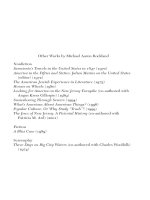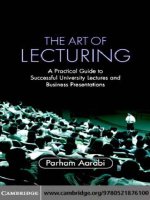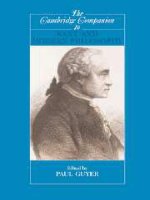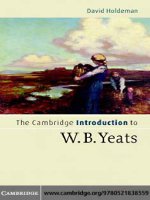0521822424 cambridge university press the cambridge companion to early modern philosophy oct 2006
Bạn đang xem bản rút gọn của tài liệu. Xem và tải ngay bản đầy đủ của tài liệu tại đây (1.85 MB, 417 trang )
THE CAMBRIDGE COMPANION TO
EARLY MODERN PHILOSOPHY
The Cambridge Companion to Early Modern Philosophy is
a comprehensive introduction to the central topics and
changing shape of philosophical inquiry in the seventeenth
and eighteenth centuries. It explores one of the most innovative periods in the history of Western philosophy,
extending from Montaigne, Bacon, and Descartes through
Hume and Kant. During this period, philosophers initiated
and responded to major intellectual developments in natural
science, religion, and politics, transforming in the process
concepts and doctrines inherited from ancient and medieval
philosophy. In this Companion, leading specialists examine
early modern treatments of the methodological and conceptual foundations of natural science, metaphysics, philosophy of mind, logic and language, moral and political
philosophy, and theology. A final chapter looks forward to
the philosophy of the Enlightenment. This will be an invaluable guide for all who are interested in the philosophical
thought of the early modern period.
is Professor of Philosophy at the University of California, San Diego. He is the author of Leibniz
and the Rational Order of Nature (1995), editor (with
J. A. Cover) of Leibniz: Nature and Freedom (2005), and
editor and translator (with Brandon Look) of The Leibniz–
Des Bosses Correspondence (2007).
DONALD RUTHERFORD
Cambridge Collections Online © Cambridge University Press, 2007
OTHER VOLUMES IN THE SERIES OF CAMBRIDGE COMPANIONS
ABELARD Edited by JEFFREY E. BROWER and KEVIN GUILFOY
ADORNO Edited by THOMAS HUHN
ANSELM Edited by BRIAN DAVIES and BRIAN LEFTOW
AQUINAS Edited by NORMAN KRETZMANN and ELEONORE
STUMP
ARABIC PHILOSOPHY Edited by PETER ADAMSON and
RICHARD C. TAYLOR
HANNAH ARENDT Edited by DANA VILLA
ARISTOTLE Edited by JONATHAN BARNES
AUGUSTINE Edited by ELEONORE STUMP and NORMAN
KRETZMANN
BACON Edited by MARKKU PELTONEN
SIMONE DE BEAUVOIR Edited by CLAUDIA CARD
BERKELEY Edited by KENNETH P. WINKLER
BRENTANO Edited by DALE JACQUETTE
CRITICAL THEORY Edited by FRED RUSH
DARWIN Edited by JONATHAN HODGE and GREGORY RADICK
DESCARTES Edited by JOHN COTTINGHAM
DUNS SCOTUS Edited by THOMAS WILLIAMS
EARLY GREEK PHILOSOPHY Edited by A. A. LONG
FEMINISM IN PHILOSOPHY Edited by MIRANDA FRICKER
and JENNIFER HORNSBY
FOUCAULT Edited by GARY GUTTING
FREUD Edited by JEROME NEU
GADAMER Edited by ROBERT J. DOSTAL
GALILEO Edited by PETER MACHAMER
GERMAN IDEALISM Edited by KARL AMERIKS
GREEK AND ROMAN PHILOSOPHY Edited by DAVID
SEDLEY
HABERMAS Edited by STEPHEN K. WHITE
HEGEL Edited by FREDERICK BEISER
HEIDEGGER Edited by CHARLES GUIGNON
HOBBES Edited by TOM SORELL
HUME Edited by DAVID FATE NORTON
HUSSERL Edited by BARRY SMITH and DAVID
WOODRUFF
SMITH
WILLIAM JAMES
Edited by
RUTH ANNA PUTNAM
Cambridge Collections Online © Cambridge University Press, 2007
KANT Edited by PAUL GUYER
KANT AND MODERN PHILOSOPHY
Edited by
PAUL
GUYER
KEYNES Edited by ROGER BACKHOUSE and BRADLEY BATEMAN
KIERKEGAARD Edited by ALASTAIR HANNAY and GORDON
MARINO
LEIBNIZ Edited by NICHOLAS JOLLEY
LEVINAS Edited by SIMON CRITCHLEY and
ROBERT
BERNASCONI
LOCKE Edited by VERE CHAPPELL
MAIMONIDES Edited by KENNETH SEESKIN
MALEBRANCHE Edited by STEVEN NADLER
MARX Edited by TERRELL CARVER
MEDIEVAL JEWISH PHILOSOPHY Edited by DANIEL H.
FRANK and OLIVER LEAMAN
MEDIEVAL PHILOSOPHY Edited by A. S. MCGRADE
MERLEAU-PONTY Edited by TAYLOR CARMAN and MARK
HANSEN
MILL Edited by JOHN SKORUPSKI
MONTAIGNE Edited by ULLRICH LANGER
NEWTON Edited by I. BERNARD COHEN and GEORGE E. SMITH
NIETZSCHE Edited by BERND MAGNUS and KATHLEEN
HIGGINS
OCKHAM Edited by PAUL VINCENT SPADE
PASCAL Edited by NICHOLAS HAMMOND
PEIRCE Edited by CHERYL MISAK
PLATO Edited by RICHARD KRAUT
PLOTINUS Edited by LLOYD P. GERSON
QUINE Edited by ROGER F. GIBSON
RAWLS Edited by SAMUEL FREEMAN
THOMAS REID Edited by TERENCE CUNEO and
RENE VAN
WOUDENBERG
ROUSSEAU Edited by PATRICK RILEY
BERTRAND RUSSELL Edited by NICHOLAS GRIFFIN
SARTRE Edited by CHRISTINA HOWELLS
SCHOPENHAUER Edited by CHRISTOPHER JANAWAY
THE SCOTTISH ENLIGHTENMENT Edited by
ALEXANDER BROADIE
Cambridge Collections Online © Cambridge University Press, 2007
ADAM SMITH Edited by KNUD HAAKONSSEN
SPINOZA Edited by DON GARRETT
THE STOICS Edited by BRAD INWOOD
TOCQUEVILLE Edited by CHERYL B. WELCH
WITTGENSTEIN Edited by HANS SLUGA and
Cambridge Collections Online © Cambridge University Press, 2007
DAVID STERN
The Cambridge Companion to
EARLY MODERN
PHILOSOPHY
Edited by Donald Rutherford
University of California, San Diego
Cambridge Collections Online © Cambridge University Press, 2007
cambridge university press
Cambridge, New York, Melbourne, Madrid, Cape Town, Singapore,
Sa˜o Paulo
cambridge university press
The Edinburgh Building, Cambridge cb2 2ru, UK
Published in the United States of America by Cambridge University Press,
New York
www.cambridge.org
Information on this title: www.cambridge.org/9780521529624
© Cambridge University Press 2006
This publication is in copyright. Subject to statutory exception
and to the provisions of relevant collective licensing agreements,
no reproduction of any part may take place without
the written permission of Cambridge University Press.
First published 2006
Printed in the United Kingdom at the University Press, Cambridge
A catalogue record for this book is available from the British Library
isbn-13
isbn-10
isbn-13
isbn-10
978-0-521-82242-8 hardback
0-521-82242-4 hardback
978-0-521-52962-4 paperback
0-521-52962-x paperback
Cambridge University Press has no responsibility for the persistence or
accuracy of URLs for external or third-party internet websites referred to
in this publication, and does not guarantee that any content on such
websites is, or will remain, accurate or appropriate.
Cambridge Collections Online © Cambridge University Press, 2007
CONTENTS
423582
List of figures
page
ix
Notes on contributors
Preface
x
xiii
List of abbreviations
xiv
Introduction
DONALD RUTHERFORD
1
1
Innovation and orthodoxy in early modern
philosophy
DONALD RUTHERFORD
2
11
Knowledge, evidence, and method
STEPHEN GAUKROGER
3
39
From natural philosophy to natural science
DENNIS DES CHENE
4
67
Metaphysics
NICHOLAS JOLLEY
5
95
The science of mind
TAD SCHMALTZ
6
136
Language and logic
MICHAEL LOSONSKY
7
170
The passions and the good life
SUSAN JAMES
vii
Cambridge Collections Online © Cambridge University Press, 2007
198
viii
Contents
8
The foundations of morality: virtue, law, and
obligation
STEPHEN DARWALL
221
Theories of the state
A . JOHN SIMMONS
250
10
Theology and the God of the philosophers
THOMAS M . LENNON
274
11
Scholastic schools and early modern
philosophy
M . W . F . STONE
299
Toward enlightenment: Kant and the sources
of darkness
J . B . SCHNEEWIND
328
9
12
Short biographies of major early modern
philosophers
353
Bibliography
365
Index
401
Cambridge Collections Online © Cambridge University Press, 2007
FIGURES
1 Classification of the sciences, Hobbes, Leviathan, ch. 9
2 Representation of addition, Descartes, Rules, 18
3 Model of the rainbow, Descartes, Me´te´ores
ix
Cambridge Collections Online © Cambridge University Press, 2007
page
13
61
62
NOTES ON CONTRIBUTORS
is John Dewey Collegiate Professor of Philosophy
at the University of Michigan. He has written widely in moral
philosophy and the history of ethics, and is the author of Impartial
Reason (1983), The British Moralists and the Internal “Ought”:
1640–1740 (1995), Philosophical Ethics (1998), Welfare and Rational Care (2002), and The Second-Person Standpoint (2006).
STEPHEN DARWALL
is Professor of Philosophy at Washington University in St. Louis. He is the author of Physiologia: Natural Philosophy in Late Aristotelian and Cartesian Thought (1996), Life’s Form:
Late Aristotelian Conceptions of the Soul (2000), and Spirits and
Clocks: Machine and Organism in Descartes (2001).
DENNIS DES CHENE
is Professor of History of Philosophy and History of Science and ARC Professorial Fellow at the University of
Sydney. He is author of Explanatory Structures (1978), Cartesian
Logic (1985), Descartes: An Intellectual Biography (1995), Francis
Bacon and the Transformation of Early-Modern Philosophy (2001),
Descartes’ System of Natural Philosophy (2002), and The Emergence of a Scientific Culture in the West, 1210–1685: Science and
the Making of Modernity, volume I (forthcoming).
STEPHEN GAUKROGER
SUSAN JAMES is Professor of Philosophy at the Birkbeck School of
Philosophy, University of London. She is author of The Content of
Social Explanation (1984) and Passion and Action: The Emotions in
Seventeenth-Century Philosophy (1997), and editor (with Gisela
Bock) of Beyond Equality and Difference (1992).
x
Cambridge Collections Online © Cambridge University Press, 2007
Notes on contributors
xi
NICHOLAS JOLLEY is Professor of Philosophy at the University of
California, Irvine. He is the author of Leibniz and Locke: A Study
of the New Essays on Human Understanding (1984), The Light of
the Soul: Theories of Ideas in Leibniz, Malebranche, and Descartes
(1990), Locke: His Philosophical Thought (1999), and Leibniz (2005).
He is the editor of The Cambridge Companion to Leibniz (1995) and
co-editor of Nicolas Malebranche’s Dialogues on Metaphysics and
on Religion (1997).
THOMAS M . LENNON
is Professor of Philosophy at the University of
Western Ontario. He is the author of The Battle of Gods and Giants:
The Legacies of Descartes and Gassendi, 1655–1715 (1993), Reading
Bayle (1999), and (with Patricia Easton) The Cartesian Empiricism of Franc¸ois Bayle (1992), editor and translator of Against Cartesian Philosophy: Pierre-Daniel Huet’s Censura Philosophiae
Cartesianae (2003), and (with P. J. Olscamp) Nicolas Malebranche,
The Search after Truth and Elucidations of the Search after Truth
(1997), and editor of Cartesian Views: Essays Presented to Richard
A. Watson (2003).
is Professor of Philosophy at Colorado State
University. He is author of Linguistic Turns in Modern Philosophy
(2005) and Enlightenment and Action from Descartes to Kant: Passionate Thought (2001), and editor of Wilhelm von Humboldt’s On
Language (1999). He is co-author (with Heimir Geirsson) of Beginning Metaphysics (1998) and co-editor (with Geirsson) of Readings
in Language and Mind (1996).
MICHAEL LOSONSKY
is Professor of Philosophy at the University of
California, San Diego. He is the author of Leibniz and the Rational
Order of Nature (1995), editor (with J. A. Cover) of Leibniz: Nature
and Freedom (2005), and editor and translator (with Brandon Look)
of The Leibniz–Des Bosses Correspondence (2007).
DONALD RUTHERFORD
TAD SCHMALTZ is Professor of Philosophy at Duke University. He is
the author of Malebranche’s Theory of the Soul (1996) and Radical
Cartesianism (2002), and has edited Receptions of Descartes (2005).
He currently is editor of the Journal of the History of Philosophy.
Cambridge Collections Online © Cambridge University Press, 2007
xii
Notes on contributors
J . B . SCHNEEWIND , Professor Emeritus of Philosophy, Johns Hopkins
University, is the author of Sidgwick’s Ethics and Victorian Moral
Philosophy (1977) and The Invention of Autonomy (1998). He has
also edited an anthology, Moral Philosophy from Montaigne to Kant
(1990), and written numerous articles on the history of ethics.
A . JOHN SIMMONS
is Commonwealth Professor of Philosophy and
Professor of Law at the University of Virginia. He has been an editor
of the journal Philosophy & Public Affairs since 1982. He is the
author of Moral Principles and Political Obligations (1979), The
Lockean Theory of Rights (1992), On the Edge of Anarchy (1993),
Justification and Legitimacy (2000), Is There A Duty to Obey the
Law? For and Against (with C. H. Wellman) (2005), and many
articles in political, moral, and legal theory. He has also edited
International Ethics (1985) and Punishment (1995).
M . W . F . STONE
is Professor of Philosophy at the Higher Institute of
Philosophy, Catholic University, Leuven, Belgium. He is the author
of many articles on late medieval and early modern scholasticism,
and a forthcoming two-volume history of casuistry, The Subtle Arts
of Casuistry: An Essay in History of Moral Philosophy. His present
research is on ideas of grace and nature in early modern philosophy.
Cambridge Collections Online © Cambridge University Press, 2007
PREFACE
This Cambridge Companion aims to serve as an introduction and
guide to what has come to be known as “early modern philosophy”–
roughly, philosophy spanning the period between the end of the
sixteenth century and the end of the eighteenth century, or, in terms
of figures, Montaigne through Kant. Its intended audience includes
both students of philosophy and those with a general interest in the
period who wish to know more about how philosophy relates to
contemporary developments in science, religion, and politics. At the
same time, it is hoped that the chapters are framed in such a way
that even specialists will be offered a fresh look at the philosophical
thought of early modern Europe.
Many people have contributed to the production of this Companion. Besides the individual authors, to whom I owe a special debt,
I would like to thank several anonymous reviewers for the Press,
who provided useful suggestions about the contents of the volume.
In early work on it, I was aided by Matthew Kisner; valuable assistance was provided later by Kristen Irwin, who also collaborated on
the short biographies that are included as an appendix. Helpful
advice was offered along the way by Richard Arneson, David Brink,
Daniel Garber, Steven Nadler, and Alison Simmons. Throughout
the editorial process, Hilary Gaskin has been a source of encouragement and good counsel, for which I am grateful.
My greatest thanks are reserved, as always, for Madeleine
Picciotto, who created space, time, and other conditions for the
possibility of this book.
xiii
Cambridge Collections Online © Cambridge University Press, 2007
ABBREVIATIONS
Full references appear in the bibliography under Primary Sources.
BACON
New Org.
New Organon (Bacon 2000)
BOYLE
Origin
The Origin of Forms and Qualities According to the
Corpuscular Hypothesis (in Boyle 1991)
DESCARTES
AT
CSM
Passions
Princ.
Œuvres de Descartes, Adam and Tannery (Descartes
1974–86)
The Philosophical Writings of Descartes, Cottingham
et al. (Descartes 1984–91)
The Passions of the Soul (in AT XI and in CSM I)
Principles of Philosophy (in AT VIIIA [Latin] and IXB
[French] and in CSM I)
HOBBES
Leviathan (Hobbes 1994)
Lev.
HUME
Treatise
Enquiry
A Treatise on Human Nature (Hume 2000)
Enquiry concerning Human Understanding (in Hume
1975)
xiv
Cambridge Collections Online © Cambridge University Press, 2007
Abbreviations
xv
KANT
Ges. Schr. Gesammelte Schriften, Ko¨niglich preussischen (later:
Berlin) Akademie der Wissenschaften (Kant 1910– ).
LEIBNIZ
AG
GP
L
M
Discourse
New Ess.
Theod.
Philosophical Essays, Ariew and Garber (Leibniz 1989)
Die philosophischen Schriften, Gerhardt (Leibniz
1875–90)
Philosophical Papers and Letters, Loemker (Leibniz
1969)
The Leibniz–Arnauld Correspondence, Mason (Leibniz
1967)
Discourse on Metaphysics (in AG and L)
New Essays on Human Understanding (Leibniz 1981)
Theodicy: Essays on the Goodness of God, the
Freedom of Man and the Origin of Evil (Leibniz 1952)
LOCKE
Essay
An Essay concerning Human Understanding (Locke
1975)
MALEBRANCHE
OC
Dial.
Search
TNG
Œuvres comple`tes, Robinet (Malebranche 1958–84)
Dialogues on Metaphysics and on Religion
(Malebranche 1997a)
The Search after Truth (Malebranche 1997b)
Treatise on Nature and Grace (Malebranche 1992)
SPINOZA
Ethics
TTP
Ethics Demonstrated in Geometrical Order (in Spinoza
1985)
Theological-Political Treatise (Spinoza 1998)
´ REZ
SUA
Disp. met. Disputationes metaphysicae (in Sua´rez 1856–78,
XXV–XXVI)
Cambridge Collections Online © Cambridge University Press, 2007
Cambridge Collections Online © Cambridge University Press, 2007
DONALD RUTHERFORD
Introduction
The seventeenth and eighteenth centuries have long been recognized as an especially fruitful period in the history of Western
philosophy. Most often this has been associated with the achievements of a handful of great thinkers: the so-called “rationalists”
(Descartes, Spinoza, Leibniz) and “empiricists” (Locke, Berkeley,
Hume), whose inquiries culminate in Kant’s “Critical philosophy.”1
These canonical figures have been celebrated for the depth and rigor
of their treatments of perennial philosophical questions, concerning, for example, existence, modality, causality, knowledge, obligation, and sovereignty, as well as for their efforts to push philosophy
in new directions, challenging many of the assumptions of ancient
and medieval philosophy. In this connection, it has been argued that
epistemology assumes a new significance in the early modern
period as philosophers strive to define the conditions and limits of
human knowledge. Yet early modern philosophers make major contributions in almost every area of philosophy, and in many cases
their conclusions continue to serve as starting points for present-day
debates. The chapters in this Companion are designed to acquaint
the reader with the most important developments in early modern
philosophy and to point the way toward more advanced studies in
the field.
THE NEW HISTORY OF EARLY MODERN PHILOSOPHY
Few would challenge the notion that the early modern period is a
rich and even revolutionary era in the history of philosophy. Nevertheless, scholarship published during the last thirty years has led to
a revision in our conception of the scope and significance of early
1
Cambridge Collections Online © Cambridge University Press, 2007
2
DONALD RUTHERFORD
modern philosophy. Four developments are noteworthy, all of them
associated with an increased emphasis on a contexualized understanding of the practice of philosophy and of the knowledge it
produces.
First, historians have challenged the assumption that early
modern philosophy can be adequately comprehended in terms of
the major published works of its most famous figures. It is now a
commonplace that to understand a philosopher’s views – expressed
in the well-honed sentences of a book such as Descartes’s Meditations or Kant’s Critique of Pure Reason – requires understanding
them in relation to the entire corpus of the philosopher’s writings,
published and unpublished. Correspondences, preliminary drafts,
and subsequent revisions of published texts are all seen as important
sources of evidence. In addition, it is increasingly acknowledged
that our understanding of a canonical text can be deepened by
reading it in conjunction with the works of a philosopher’s immediate predecessors and contemporaries – works that often supply an
illuminating background for its interpretation.2 In short, even if a
published treatise carries an imprimatur as the authoritative expression of a philosopher’s position on a given topic, understanding that
position often is facilitated, and sometimes is only possible, by
relating it to other pieces of textual evidence.
A second and more profound challenge has targeted the privileged
status accorded to the philosophers making up the traditional canon
of early modern philosophy. In recent years, the cast of leading
characters has expanded to include an array of figures who are
significant thinkers in their own right and whose thought intersects
at vital points with that of the canonical seven. These figures include Michel de Montaigne, Francisco Sua´rez, Hugo Grotius, Francis
Bacon, Pierre Gassendi, Thomas Hobbes, Henry More, Ralph
Cudworth, Anne Conway, Antoine Arnauld, Nicolas Malebranche,
Blaise Pascal, Pierre Bayle, Samuel Pufendorf, Francis Hutcheson,
Thomas Reid, Adam Smith, Jean-Jacques Rousseau, and Christian
Wolff – to mention only some of the authors whose writings have
been subject to intensive analysis in the secondary literature. By
attending to their works, historians have arrived at fuller and more
nuanced accounts of philosophy’s development in the early modern
period.
Cambridge Collections Online © Cambridge University Press, 2007
Introduction
3
One result of these efforts to map more accurately the landscape
of early modern philosophy has been a growing skepticism concerning traditional interpretative categories (e.g. “rationalist” versus
“empiricist”). Such dichotomies have been criticized as inadequate
for understanding the relationships among the views of early
modern philosophers. Moreover, they have tended to reflect a bias
in the history of philosophy toward epistemology and metaphysics
and away from ethics, political philosophy, and theology. Recent
scholarship has sought to counter this bias both through detailed
studies of the practical philosophy of the early modern period, and
through studies that aim to deliver a synoptic picture of the views of
particular thinkers, emphasizing the close connections between, for
example, metaphysical theories and ethical theories.3
Finally, the development of early modern philosophy increasingly has been recognized to be inseparable from, and in many cases
dependent upon, a larger set of intellectual and cultural changes,
which include the emergence of modern natural science, theological
conflicts within and between the Catholic and Protestant churches,
and the movement toward the modern nation-state. Within the early
modern period, philosophy retains a distinct identity as a discipline
whose concerns are continuous with those of ancient and medieval
philosophy, on the one hand, and later modern philosophy, on the
other. What the new history of early modern philosophy has stressed,
however, is that abstract philosophical problems acquire a determinate content within a specific intellectual context – one that must be
appreciated in order to understand the theories and arguments of
the philosophers in question. In most cases one finds no sharp line
dividing philosophical debates concerning, for example, the nature
of matter or freedom of the will, and related debates in physics or
theology. Thus, again, one is forced to take a more expansive view of
the relevant textual evidence than previously was common in the
history of philosophy.
The present volume reflects these priorities of the new history of
early modern philosophy. Its focus is the changing shape of philosophical inquiry in the early modern period, with emphasis placed
on the transformation of concepts and doctrines inherited from
ancient and medieval philosophy and the arguments used to justify
these transformations. Unlike other guides to the philosophy of the
Cambridge Collections Online © Cambridge University Press, 2007
4
DONALD RUTHERFORD
period, this Cambridge Companion is not organized by individual
philosophers but rather by areas of inquiry. Following an opening
chapter that looks broadly at the character and defining tensions of
early modern philosophy (Donald Rutherford), the volume proceeds
systematically through chapters dedicated to the methodological
and conceptual foundations of natural science (Stephen Gaukroger;
Dennis Des Chene), metaphysics (Nicholas Jolley), philosophy
of mind (Tad Schmaltz), logic and language (Michael Losonksy),
ethics (Susan James; Stephen Darwall), political philosophy (A. John
Simmons), theology (Thomas M. Lennon), and the enduring vitality
of scholastic thought (M. W. F. Stone). A final chapter looks ahead
to the end of the early modern period through the lens of the
Enlightenment philosophy of Kant (J. B. Schneewind).
THE PHILOSOPHICAL LIFE
Early modern philosophers come in many stripes.4 Some were university teachers, some were not. Some were clerics, some were not.
As one might expect, almost all were men, but a number of women
are now recognized as making notable contributions to the philosophy of the early modern period.5 With the exception of Spinoza, all
the major figures of seventeenth- and eighteenth-century philosophy were professed Christians, though what exactly such a profession meant was a point of contention, reflecting the continued
prominence of religious discord and theological debate in the period.
Although some early modern philosophers chose to pursue
careers as university teachers, many were wary of following such a
path for fear of the restrictions that might be placed on their freedom to philosophize. Spinoza famously turned down the offer of a
professorship in Heidelberg for this reason, choosing to support
himself as a lens grinder. In the middle of the eighteenth century,
Christian Wolff was forced to flee his position at Halle, because
rumors had spread to the king of the dangerous political consequences that could be inferred from his doctrines. For the most part,
it was thought that a philosophical life could best be pursued outside the university. In some cases, this was made possible by a
private income (Descartes, Shaftesbury); in others it depended upon
securing a religious office (Gassendi, Malebranche, Berkeley) or
Cambridge Collections Online © Cambridge University Press, 2007
Introduction
5
other employment (Bacon, Hobbes, Leibniz) that left one with sufficient time and freedom to pursue one’s own reflections.
For those philosophers who eschewed a university career, philosophy was for the most part a solitary endeavor. From the beginning of the seventeenth century, however, concerted attempts were
made to share ideas and intelligence about the latest developments
in natural philosophy – a pattern of cooperation that culminated in
the establishment of the first scientific societies in Florence, Paris,
and London. Prior to this, Marin Mersenne had convened gatherings
that brought together many of the leading thinkers in Paris, including at different times Descartes, Gassendi, Hobbes, and Grotius.6
Mersenne also carried on an extensive correspondence that connected scholars from across Europe, an activity in which he was
followed by Henry Oldenburg, secretary of the Royal Society of
London during the 1660s, and by Leibniz. In these ways, philosophers who were not university teachers were nonetheless drawn
together in informal intellectual communities.
The world of early modern philosophy was an intimate one.
Through his friend Nicolas-Claude Fabri de Peiresc, Gassendi
obtained one of Galileo’s new telescopes, with which he made a
series of important observations. In 1634, while traveling through
Italy, Hobbes paid a personal visit to Galileo, then under house arrest
near Florence. Through the offices of Mersenne, Descartes’s Meditations were published in 1641 with objections by Arnauld, Gassendi,
and Hobbes. When Leibniz arrived in Paris in 1672, he made the
acquaintance of Malebranche and Arnauld. On departing Paris four
years later, he spent a week in discussion with Spinoza in Holland. In
his early life, he had written to a then elderly Hobbes; he engaged in
important correspondences with Arnauld and Wolff; he wrote books
responding to works by Bayle and Locke; and near the end of his life
he was drawn into a bitter feud with Newton over their rival claims
to priority in the discovery of the calculus. Such patterns of contact
continued in the eighteenth century with philosophers such as
Hume, who composed much of his Treatise of Human Nature in
France at La Fle`che, where Descartes had studied over a century
earlier. Hume was a friend of the Scottish philosophers Francis
Hutcheson and Adam Smith, and late in life made an abortive
attempt to arrange refuge for Jean-Jacques Rousseau in England.
Cambridge Collections Online © Cambridge University Press, 2007
6
DONALD RUTHERFORD
Despite the largely solitary nature of their own activity, then,
philosophers in the seventeenth and eighteenth centuries actively
studied, disagreed with, and responded to the views of their contemporaries and recent predecessors. This makes the period an especially attractive one in which to study the development of
philosophical ideas through the active engagement of thinkers with
one another. Such an approach has served as a starting point for
much recent research. Moving beyond the question of whether a
given philosopher may or may not have read the works of an influential precursor, historians of philosophy have endeavored to disentangle and reconstruct lines of argument that link the views of
successive thinkers, illuminating in this way the sources of philosophical creativity and the standards of rationality that guide the
progress of philosophy.
LOOKING AHEAD
The seventeenth century is a period of sweeping intellectual
change. From the groundbreaking works of Bacon and Galileo to
the crowning achievement of Newton’s Principia, the century
ushers in a radically new conception of the natural world and the
place of human beings in it. Equally dramatic are the searching
reexaminations of the foundations of law, liberty, and political
sovereignty carried out by such thinkers as Grotius, Hobbes, and
Locke. Philosophy is transformed at every level by these developments. Well-entrenched assumptions about causality, matter,
mind, knowledge, language, law, and even God are subject to reappraisal and in many cases revision. The result is the body of
philosophical theories we today think of as the first examples of
early modern philosophy, distinguishing them in this way from the
inherited synthesis of ancient Greek philosophy and Christianity
that had prevailed to that point.
Many of the chapters in this Companion begin from a view
of early modern philosophy as defined by the efforts of early
seventeenth-century thinkers to throw off the “yoke of Aristotle.”
Often, it was not the philosophy of Aristotle himself whom these
thinkers were reacting against, but a version of scholastic Aristotelianism (or “scholasticism”) which prevailed in university teaching
through the seventeenth century, and in some locations well into
Cambridge Collections Online © Cambridge University Press, 2007
Introduction
7
the eighteenth. Fostered by the innovators themselves (e.g. Bacon,
Hobbes, Descartes), the dominant narrative of the history of early
modern philosophy remains that of a revolutionary movement that
aims to illuminate the darkness of a sterile orthodoxy with the
sharp light of a new critical reason.
The chapters by Donald Rutherford (“Innovation and orthodoxy
in early modern philosophy”) and M. W. F. Stone (“Scholastic
schools and early modern philosophy”) argue in different ways for
the need to qualify this narrative. Rutherford shows that, with a few
exceptions, the leading innovators of early modern philosophy were
committed to maintaining a harmony between the conclusions of
philosophical reason and the tenets of Christianity. However radical
their challenges to Aristotelian natural philosophy, logic, and epistemology, they sought to preserve the compatibility of their views
with Christian orthodoxy, much as their medieval predecessors had
done. From the other direction, Stone details how early modern
scholastic philosophy is far from the moribund tradition that it is
often depicted as being. There is considerable innovation and critical reflection here as well, highlighted by the widely influential
works of the Jesuits Luis Molina and Francisco Sua´rez. Thus, it is an
oversimplification to think of early modern philosophy exclusively
in terms of the replacing of the old by the new. Other chapters
extend this picture of the complexity of the play of the old versus
the new in the early modern period. In the apt image offered by
Nicholas Jolley in his chapter “Metaphysics,” early modern philosophers often can be seen as delivering new wine in old bottles –
bottles that later are found to hold with difficulty the potent vintage
that has been poured into them.
A further point to keep in mind is that during the early modern
period, ‘philosophy’ does not designate a unitary enterprise. Both
diachronically and synchronically, it is a constellation of loosely
related investigations of fundamental questions about nature, humanity, and God. We can helpfully distinguish three stages in
the evolution of early modern philosophy, corresponding roughly
to the three centuries encompassed by the period. Extending a
pattern that begins in the Italian Renaissance, the sixteenth century
witnesses the reemergence of a host of ancient philosophical views –
Platonism, Pyrrhonian skepticism, Epicureanism, Stoicism – along
with a variety of attempts to synthesize their insights and to render
Cambridge Collections Online © Cambridge University Press, 2007
8
DONALD RUTHERFORD
them consistent with Christianity. The results are, by ancient
lights, eclectic mixtures of ideas, but such mixtures make for a
fertile soil from which grow many of the innovations of the next
century.
The seventeenth century is best known for landmark advances in
the understanding of nature, both those that we take as defining the
beginnings of modern natural science and those that we see as
characteristically philosophical reflections on the nature of mind
and body, and the relation of human beings to God. Here the philosopher who casts the longest shadow is Descartes, whose views
stimulate the inquiries of a succession of followers – Malebranche,
Arnauld, Pascal, Spinoza, Leibniz – dedicated to extending or correcting his ideas. Yet Descartes is by no means the only seminal
philosophical thinker of the seventeenth century. During his lifetime, his greatest rival is Gassendi, whose efforts to defend a Christianized Epicureanism help to make respectable the revival of
ancient atomism. Equally significant are the contributions of
Hobbes, a friend and ally of Gassendi, who along with Spinoza
formulates the most serious challenge in the seventeenth century
to received ideas in moral and political philosophy, and Locke, who
is instrumental in moving philosophy’s center of gravity away from
speculative metaphysics.
Where the advances of seventeenth-century philosophy are
often tentative attempts to reconceive the broadest outlines of reality, the eighteenth century builds on the secure foundations of
Newton’s unified theory of the mathematical structure of nature.
For eighteenth-century philosophers, consequently, there is comparatively little mystery about the operation of nature. With this
issue settled, the weight of philosophical interest shifts from theoretical philosophy to practical philosophy – above all, to the question
of the grounds of the moral and political obligations of human
beings. Underlying many of the debates of the century is the question that might be seen as the most significant legacy of early
modern philosophy: Can human life, and whatever we judge to be
of value about it, be defined independently of reference to God,
conceived according to biblical teaching as humanity’s creator,
lawgiver, and judge? The previous centuries had revealed the deep
and bloody rifts that could open between men who disagreed
about religion. Consequently, the motivation to rise above these
Cambridge Collections Online © Cambridge University Press, 2007









